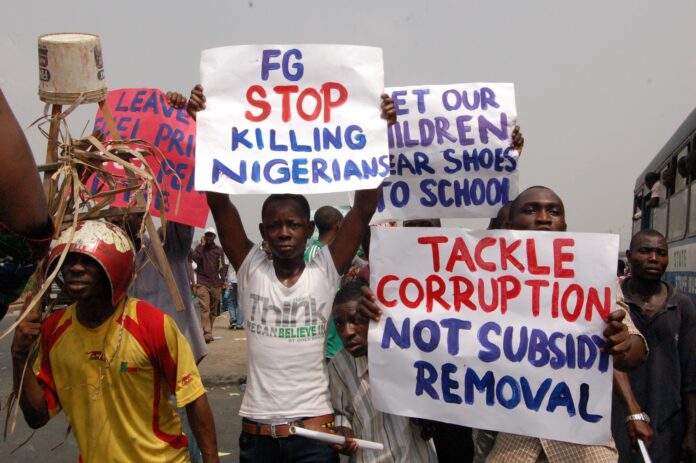Buhari suspends fuel subsidy removal to retire in peace
By Jeph Ajobaju, Chief Copy Editor
Abuja has shelved fuel subsidy removal apparently to enable President Muhammadu Buhari retire to Daura in peace on May 29 amid strident Labour opposition to subsidy removal without fixing local refineries to stop fuel imports and reduce the high cost of living.
The National Economic Council (NEC) on Thursday in Abuja asked the federal government to put on ice the June deadline for the removal of petrol subsidy pending the review of plans to provide succour for Nigerians.
The World Bank recently loaned Nigeria $800 million to provide palliatives to citizens most likely to be impacted by the consequences of subsidy removal.
But many Nigerians are skeptical, arguing the money – which adds to national debt – will simply be stolen by government officials as usual.
Subsidy should not be removed now, the NEC argued, saying Abuja would broaden consultations with state governments and other stakeholders such as labour unions, petroleum marketers, the Ministry of Finance, Nigerian Upstream Petroleum Regulatory Commission (NUPRC) and representatives of the incoming administration.
This “expanded committee” would “determine if the removal can be done by June as planned,” it stressed
Finance Minister Zainab Ahmed disclosed this after the valedictory NEC meeting chaired by Vice President Yemi Osinbajo at the Villa.
__________________________________________________________________
Related articles:
Fuel subsidy costs N4b – more than budgets for health, education, defence
Experts tell Abuja, fuel subsidy is not sustainable
Buhari aiding N950b scam in NNPC, says Benue
_________________________________________________________________
Timing of subsidy removal
Ahmed said there may be a need to send a supplementary budget to the National Assembly (NASS) if the incoming administration agrees to extend subsidy removal, according to reporting by The PUNCH.
She, added, however, that the NEC concluded subsidy must be “removed now, rather than later,” as Nigeria can no longer afford it.
Her words: “Council agreed that the timing of the removal of fuel subsidy should not be now; but that we should continue with all of the preparatory works that need to be done and these preparatory works have to be done in consultation with the states and other key stakeholders including representatives of the incoming administration.
“Council agreed that the fuel subsidy must be removed earlier rather than later because it is not sustainable. We cannot afford it anymore. But we have to do it in such a way that the impact of the subsidy is as much as possible, mitigated on the lives of ordinary Nigerians.
“So, this will require looking at alternatives to the fuel subsidy that needs to be planned for and subsequently put in place. But also, what needs to be done to support the people that will be most affected as a result of the removal.”
Ahmed reiterated the 2023 budget provides for subsidy only up to June 2023, and the Petroleum Industry Act (PIA) requires the deregulation of several sectors 18 months after the effective date of subsidy removal.
Panel to consider subsidy removal process
She said the government had agreed to form an expanded committee to consider the removal process. This includes determining the exact time and the measures to be taken to support the poor and vulnerable and ensure a sufficient supply of petroleum products nationwide.
“So this is a decision that has been taken to expand the committee that is currently working with representatives of the states and it will also have to be engaging with the petroleum marketers.
“The immediate committee comprises the Ministry of Finance, Budget and National Planning, the NNPCL, the regulator, and the downstream and upstream regulators.
“So there’ll be an expanded committee so that it is not just a few people’s thoughts that will guide the process so that there is sufficient consultation taking inputs from key stakeholders on the measures that need to be taken.
“What I said is that it is not going to be removed now, which means it will not be removed before the transition is completed.”
Nigeria would now be operating “two laws in the oil sector,” she stressed.
She added the incoming administration would have to amend both the Appropriation Act and the PIA to bring them at par with current realities, based on their decisions on the fuel subsidy.
“So if the committee’s work, which will include the representatives of the incoming administration determines that the removal can be done by June, the work plan will be designed to exit in June.
“But if the determination is that the period needs to be extended, that will mean that as a country will have to revisit the Appropriation Act, for example, because the 2023 budget only made provision up to June.
“So, if we’re extending beyond June, it means we have to revisit the Appropriation Act and do a supplementary or amend the bill and also the PIA.
“These are the reasons why we had to do this consultation with NEC to get input from the governors. They’re going to provide to us their representatives to work together with us to have a defined process that will take us towards the removal.
“But one thing that is clear is everybody agreed that the subsidy should be removed very quickly, because the cost is only not efficient, but is also not sustainable. And that when the time comes for removal, the removal will be done once and for all.”
Rigmarole about subsidy removal
Successive administrations have failed to cut or completely remove fuel subsidy, a socio-politically delicate matter in Africa’s largest economy.
Between January and September 2022, the government said it spent $7.5 billion on fuel subsidy, describing it as an inefficient use of resources stifling economic potential.
The International Monetary Fund (IMF) on April 12 asked Nigeria to cut borrowing, raise revenue by increasing taxes to grow its economy at 3.2 per cent in 2023.
With a tax-to-GDP ratio of 8 per cent, Nigeria ranks among the lowest globally, as its total debt is predicted to hit N77 trillion by May end.
However, the NEC argued subsidy should be removed in a way that does not worsen hardship.
“This requires looking at alternatives to fuel subsidy that need to be planned for and subsequently put in place, but also what needs to be done to reduce the impact of the removal,” Ahmed said.
“So far, what we have is that $800 million that has been secured and intact. Again, that is a matter for discussion. The states may have their own plans, they may want to have their own designated programmes different from what the federal government may want to do.”





